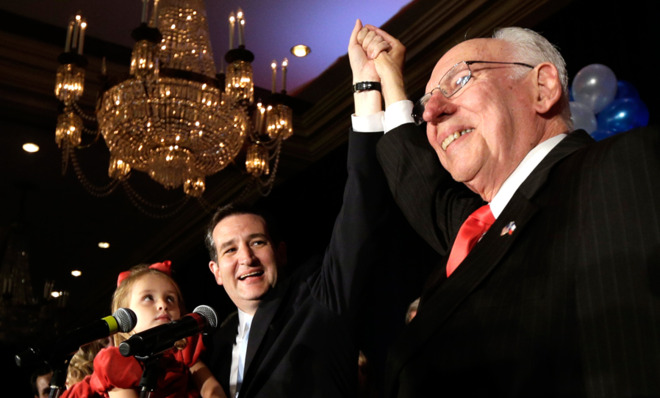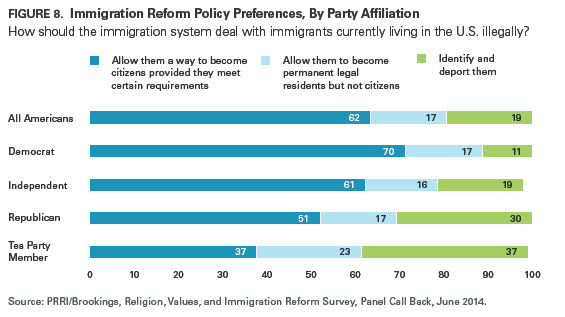The Tea Party has its own immigration problem: Cuba
To put it another way: Why does Ted Cruz support amnesty?


A free daily email with the biggest news stories of the day – and the best features from TheWeek.com
You are now subscribed
Your newsletter sign-up was successful
Comprehensive immigration reform died a slow death in the 113th Congress, the final nail in its coffin being the surprise primary loss of House Majority Leader Eric Cantor (R-Va.). Immigration wasn't the only factor in Cantor's loss to a Tea Party challenger, or even the central factor, but it was enough to spook House Republicans from even taking up the immigration bill that passed with bipartisan support in the Senate last year.
The fear among House Republicans is that if they support a bill with any path to citizenship — no matter how long and tenuous — for immigrants in the U.S. illegally, a Tea Party primary challenger will attack them from the right for being pro-"amnesty." Polls suggest that Tea Partiers (and, incidentally, Fox News viewers) are among the most antagonistic when it comes to easing immigration laws.
A large survey released in June from the Public Religion Research Institute (PRRI) and Brookings found that 62 percent of all Americans and 51 percent of Republicans support a path to citizenship for immigrants already living in the U.S. illegally. Among self-identified Tea Party members, only 37 percent backed a path to citizenship, while an equal number wanted to "identify and deport" undocumented immigrants:
The Week
Escape your echo chamber. Get the facts behind the news, plus analysis from multiple perspectives.

Sign up for The Week's Free Newsletters
From our morning news briefing to a weekly Good News Newsletter, get the best of The Week delivered directly to your inbox.
From our morning news briefing to a weekly Good News Newsletter, get the best of The Week delivered directly to your inbox.

However, there is one big exception to the Tea Party's opposition to "amnesty": Cuba.
Since 1966, Cuban immigrants have had special protections and paths to citizenship under the Cuban Adjustment Act. Cuban nationals don't have to enter the U.S. at a designated port of entry. There are no quotas limiting the number who can immigrate here. And under a 1995 adjustment to the policy called "wet feet, dry feet," all Cubans who make it to shore are eligible for legal U.S. residency after one year, and eventually citizenship. In other words: amnesty.
The two Latino politicians most identified with the Tea Party, Sens. Ted Cruz (R-Texas) and Marco Rubio (R-Fla.), are both Cuban Americans, and both benefited, directly or indirectly, from this special path to citizenship. Rubio's parents arrived in Florida in 1956, three years before Fidel Castro took power, but could travel back and forth without hassle until they got their citizenship in 1975. Rubio's political base is the South Florida Cuban American community that grew out of the post-Cuban Adjustment Act Castro flight.
Ted Cruz's father and political adviser, Rafael Cruz, is a more complicated case. After fighting with Castro's rebels, he immigrated to Texas from Cuba on a student visa in 1957, was granted U.S. political asylum when the visa expired, moved to Canada and became a Canadian citizen, had Ted Cruz, then moved back to Texas in the 1980s and became an American citizen in 2005. Ted Cruz's grandparents and aunt moved to the U.S. from Cuba in 1966.
A free daily email with the biggest news stories of the day – and the best features from TheWeek.com
Cruz, the more vocal opponent of "amnesty," has noted proudly that his father was never in the U.S. illegally. And that's the point. Not to take anything away from Rafael Cruz's inspiring coming-to-America story, but can you imagine a Mexican citizen moving between countries with such apparent ease? Or a Salvadoran?
So what's the difference between Cubans and, say, Hondurans?
Cuba has been a sworn enemy of the U.S. for decades, unlike most countries in Central America. It is run by a repressive communist regime, versus the slightly less repressive oligarchic families that run much of Central America. On the other hand, Central America is much more dangerous — Honduras has the highest murder rate in the world, at 90.4 homicides per 100,000 people, versus Cuba's rate of 4.2 homicides per 100,000. And, of course, Cuban Americans also tend to vote Republican — though less so than in the past — while President Obama won the overall Latino vote by healthy margins in both 2008 and 2012. The Cuban diaspora is concentrated in the practically must-win state of Florida, so their vote matters.
Or you could ask Rush Limbaugh about the difference between Cubans and other Latinos. In early 2013, during the height of the GOP's post-election immigration-reform fever, Limbaugh cautioned the Republicans to drop their quixotic quest to win over Latinos:
The way the Republicans are looking at it is that they think that Hispanic immigrants are made-to-order conservatives. For some reason, culturally, they think that they're invested in hard work. And using the Cuban exile model, they're exactly right. But the Hispanic demographic, if you will, or population, has shifted. And the Cuban exile model is no longer the dominant model. The Mexican immigrant model is. And that — they arrive with an entirely different view of America. And I'm sorry if this is offensive, but it's true. [Limbaugh]
The Tea Party, not being an actual political party, doesn't have an official platform. But the national GOP's 2012 plank on Cuba is probably a decent stand-in. In it, the GOP pledges to "affirm the principles of the Cuban Adjustment Act of 1966, recognizing the rights of Cubans fleeing Communism." Regarding all other immigration, the GOP's 2012 platform is a little less accommodating. Here's the relevant part of the immigration plank, introduced by Tea Party favorite Kris Kobach, the Kansas secretary of state:
We recognize that for most of those seeking entry into this country, the lack of respect for the rule of law in their homelands has meant economic exploitation and political oppression by corrupt elites. In this country, the rule of law guarantees equal treatment to every individual.... That is why we oppose any form of amnesty for those who, by intentionally violating the law, disadvantage those who have obeyed it. Granting amnesty only rewards and encourages more law breaking. [2012 GOP platform]
The platform also says that "state efforts to reduce illegal immigration must be encouraged, not attacked," specifically mentioning restrictive laws in Arizona and Alabama. It calls for completing the U.S.-Mexico border wall, and argues that "federal funding should be denied to universities that provide in-state tuition rates to illegal aliens."
At this point, you may be throwing up your hands in mock horror that politicians and political movements are inconsistent and sometimes put political expediency over ideological purity. It's a fair point. But immigration is ramping up to be a big issue this election — non-Cuban Latinos are mad and dispirited that President Obama punted on unilateral immigration reform, while Republicans are raising calls to seal America's southern border.
Just remember, when the Tea Party politicians and rank and file demand an end to "amnesty" for immigrants, they don't really oppose amnesty in principle — they just oppose it for certain groups.
Peter has worked as a news and culture writer and editor at The Week since the site's launch in 2008. He covers politics, world affairs, religion and cultural currents. His journalism career began as a copy editor at a financial newswire and has included editorial positions at The New York Times Magazine, Facts on File, and Oregon State University.
-
 6 of the world’s most accessible destinations
6 of the world’s most accessible destinationsThe Week Recommends Experience all of Berlin, Singapore and Sydney
-
 How the FCC’s ‘equal time’ rule works
How the FCC’s ‘equal time’ rule worksIn the Spotlight The law is at the heart of the Colbert-CBS conflict
-
 What is the endgame in the DHS shutdown?
What is the endgame in the DHS shutdown?Today’s Big Question Democrats want to rein in ICE’s immigration crackdown
-
 The billionaires’ wealth tax: a catastrophe for California?
The billionaires’ wealth tax: a catastrophe for California?Talking Point Peter Thiel and Larry Page preparing to change state residency
-
 Bari Weiss’ ‘60 Minutes’ scandal is about more than one report
Bari Weiss’ ‘60 Minutes’ scandal is about more than one reportIN THE SPOTLIGHT By blocking an approved segment on a controversial prison holding US deportees in El Salvador, the editor-in-chief of CBS News has become the main story
-
 Has Zohran Mamdani shown the Democrats how to win again?
Has Zohran Mamdani shown the Democrats how to win again?Today’s Big Question New York City mayoral election touted as victory for left-wing populists but moderate centrist wins elsewhere present more complex path for Democratic Party
-
 Millions turn out for anti-Trump ‘No Kings’ rallies
Millions turn out for anti-Trump ‘No Kings’ ralliesSpeed Read An estimated 7 million people participated, 2 million more than at the first ‘No Kings’ protest in June
-
 Ghislaine Maxwell: angling for a Trump pardon
Ghislaine Maxwell: angling for a Trump pardonTalking Point Convicted sex trafficker's testimony could shed new light on president's links to Jeffrey Epstein
-
 The last words and final moments of 40 presidents
The last words and final moments of 40 presidentsThe Explainer Some are eloquent quotes worthy of the holders of the highest office in the nation, and others... aren't
-
 The JFK files: the truth at last?
The JFK files: the truth at last?In The Spotlight More than 64,000 previously classified documents relating the 1963 assassination of John F. Kennedy have been released by the Trump administration
-
 'Seriously, not literally': how should the world take Donald Trump?
'Seriously, not literally': how should the world take Donald Trump?Today's big question White House rhetoric and reality look likely to become increasingly blurred
